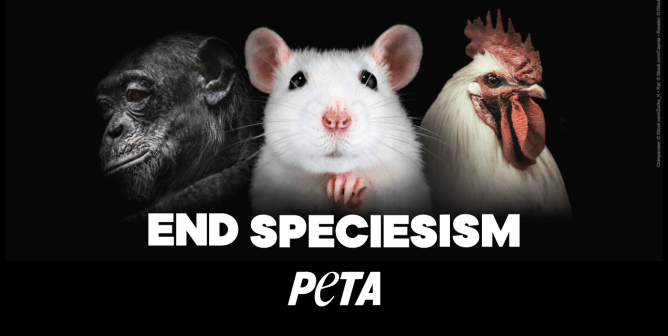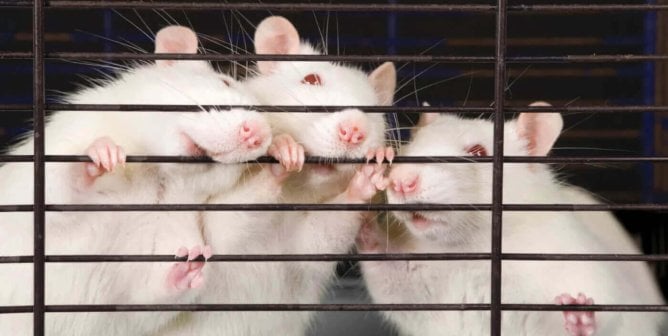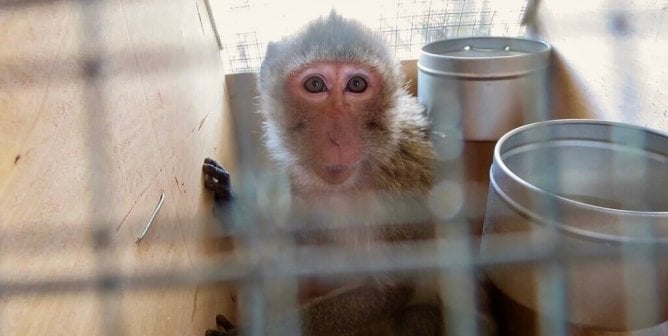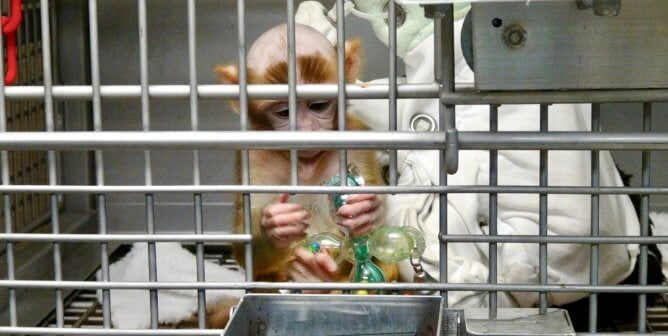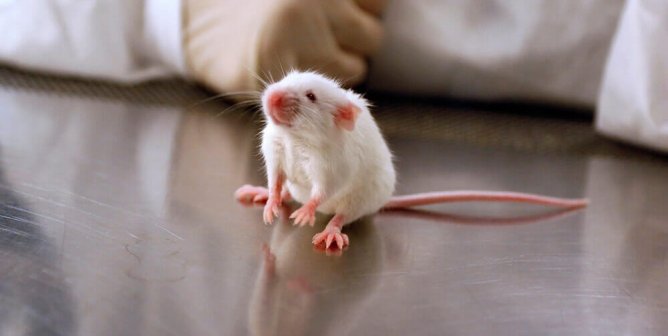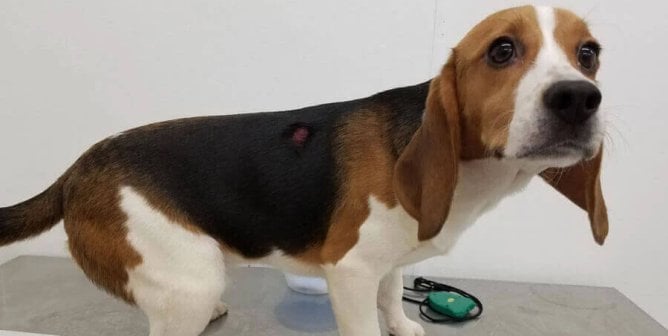A Timeline of Legislation in Virginia Related to Animal Experimentation
Every year, countless animals suffer and die in cruel and ineffective experiments across Virginia. Below, you’ll find a timeline of legislative efforts in the Commonwealth to help protect animals used in experiments. These efforts were prompted by PETA’s undercover investigation into Envigo’s now-shuttered facility, which had bred and sold beagles for experimentation all over the world. After the historic signing of five “beagle bills” aimed at protecting dogs and cats bred for use in experiments, we worked with champion legislators to expand efforts to other species and animal-testing facilities.
Timeline
2020
- January–March: Three bills concerning animals used in experiments are introduced during the Virginia General Assembly’s 2020 session, and none are passed. To see which bills were introduced and which ones have passed from 2020 to the present, visit our bill summaries page.
- October 2: PETA asks Virginia Tech President Timothy Sands to reconsider the university’s relationship with Envigo’s massive dog-breeding facility in Cumberland. We publish information regarding the university’s history of purchasing dogs for experiments from the mill despite its multiple animal welfare violations and video footage recorded by U.S. Department of Agriculture (USDA) inspectors of dogs suffering in its filthy enclosures.
2021
- November 9: PETA releases its undercover investigation into Envigo, which documents that workers with no veterinary credentials injected euthanasia drugs directly into puppies’ hearts without sedation, causing them immense pain; deprived nursing mother dogs of food for days; sprayed dogs with cold water from high-pressure hoses, leaving them drenched; and caused animals to suffer in many other ways. In one instance, a supervisor inserted a needle into a puppy’s head—without anesthetics or analgesics—in a crude attempt to drain fluid from a wound. The puppy cried out loudly, so the supervisor tried to hold the animal’s mouth shut.
- December 15: PETA announces its purchase of stock in Envigo’s parent company, Inotiv. The stock purchase allows us to attend Inotiv’s annual meetings and address its board of directors and shareholders directly about Envigo’s abuse of dogs and numerous violations of the federal Animal Welfare Act (AWA). PETA also calls on the Association for Assessment and Accreditation of Laboratory Animal Care International to revoke Envigo’s accreditation.
2022
- January: The Virginia General Assembly’s 2022 session convenes, during which 11 bills are introduced seeking to protect animals bred for experimentation. The bills target Envigo’s Cumberland facility, which breeds, confines, sells, and ships thousands of beagles for experimentation. For more information about the beagle protection bills and related legislative activity, click here.
- April 4: Glenn Youngkin signs five historic beagle protection bills (SB 87, SB 88, SB 90, SB 604, and HB 1350) after the 140 members of the Virginia General Assembly vote unanimously to protect dogs and cats bred for experiments in the Commonwealth.
- May 18 and 19: A total of 446 beagles, including at least 145 dogs found in “acute distress,” are seized from Envigo’s breeding facility. The U.S. Department of Justice (DOJ) files a federal lawsuit against Envigo, and a federal judge issues a restraining order against the company, barring its mistreatment of beagles and ordering it to stop breeding animals.
- June 13: Inotiv announces that it will close the Cumberland breeding facility. Federal courts later approve the DOJ’s plan to remove all the surviving dogs—approximately 4,000—from the facility so that they can be adopted.
- June–September: Animal protection groups across the U.S. join forces to rescue and adopt out nearly 4,000 beagles from Envigo’s Cumberland breeding facility. PETA takes in and places 25 beagles in wonderful homes, where the animals soon become cherished and respected family members.
2023
- January: The Virginia General Assembly’s 2023 session convenes, during which four bills (SB 1230, SB 1271, HB 2042, and HB 2348) are introduced to increase transparency and accountability in Virginia’s animal-testing industry.
- January 31: During a Senate subcommittee hearing, Sen. William M. Stanley Jr. says that facilities that test on animals in the Commonwealth should be held to a humane standard as stewards of those animals. He ultimately agrees to “pass-by” SB 1230 for the session to open a dialog on the issue of animal welfare and federal compliance at Virginia’s publicly funded institutions that use animals in experiments, opening the door to questions and concerns raised by all stakeholders prior to the 2024 General Assembly Session. As part of this measure, Stanley proposes sending a letter to universities that have committed critical violations of the federal Animal Welfare Act (AWA).
- February: Lobbyists working on behalf of Eastern Virginia Medical School (EVMS), Old Dominion University, the University of Virginia, Virginia Commonwealth University, and Virginia Tech oppose the proposed legislation. PETA and other stakeholders meet with the lobbyists on multiple occasions and ultimately agree to amend the bills significantly.
- February 1: J. Chapman Petersen (chair of the Senate Committee on Agriculture, Conservation and Natural Resources) and David Marsden (chair of the Senate Subcommittee on Companion Animals) send a letter to Virginia Tech, Old Dominion University, and EVMS, all of which have critical AWA violations. The letter highlights—and asks for a response to—these violations (see responses from VT and ODU here). EVMS responds months later—on June 13—only after an article is published in The Virginian-Pilot. No penalties are issued.
- February 25: Up until the last day of the 2023 General Assembly session, animal welfare stakeholders believe that a compromise regarding SB 1271/HB 2348 has been reached with Virginia’s higher-education However, university lobbyists apparently sabotage the watered-down version of these bills, resulting in amendments that further weaken the legislation. The final version of the bills require facilities to make available an already publicly accessible annual report that includes only species covered by the federal AWA—an estimated 5% of the animals used in experiments.
- March 7: PETA and other animal welfare stakeholders send a letter to Youngkin, requesting that he amend SB 1271 and HB 2348. The proposed amendment seeks to reverse the last-minute interference by university lobbyists and reinstate the requirement that facilities submit annual reports—including the “total number of animals” used in experiments—to the Commonwealth.
- March 26: Youngkin signs SB 1271/HB 2348 without amending them. The bills require animal-testing facilities to post their USDA inspection reports publicly and alert institutional leadership to any critical AWA violations.
- July 1: Animal-testing facilities are required to make any USDA inspection reports and related documentation publicly available on the homepage or landing page of their websites within 30 days of receiving the report.
Please check back here for further updates.

